Atonement
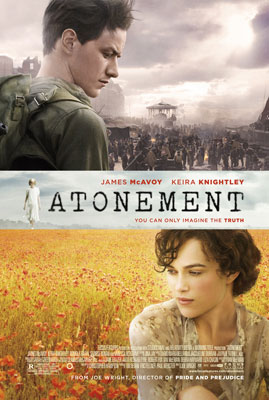
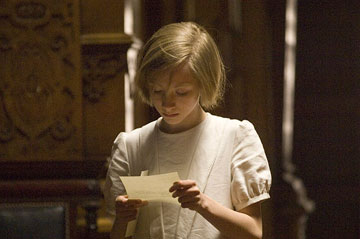 The story begins in the English countryside in 1935. The character of Briony is 13 at the time, and is watching a relationship developing between her sister Cecilia (Knightly) and a family servant named Robbie (McAvoy) with great interest and suspicion. Briony does not trust Robbie after she discovers an unfortunately-phrased letter that was intended for Cecilia's eyes only. Her suspicion of Robbie is furthered when she discovers her sister and him in an uncompromising sexual position that her young mind misinterprets. When another young girl staying with the family is raped, Briony makes a fateful decision that will change all of their lives forever. She claims she saw Robbie as the culprit of the act, and he is sent away. The remainder of the film is split into two separate storylines. Robbie goes off to fight in World War II after a stint in prison, and tries his best to keep contact with his beloved Cecilia through the great distance between them. As for Briony, she has come to regret her lie, and is trying desperately to atone for her mistakes that haunt her for the rest of her life.
The story begins in the English countryside in 1935. The character of Briony is 13 at the time, and is watching a relationship developing between her sister Cecilia (Knightly) and a family servant named Robbie (McAvoy) with great interest and suspicion. Briony does not trust Robbie after she discovers an unfortunately-phrased letter that was intended for Cecilia's eyes only. Her suspicion of Robbie is furthered when she discovers her sister and him in an uncompromising sexual position that her young mind misinterprets. When another young girl staying with the family is raped, Briony makes a fateful decision that will change all of their lives forever. She claims she saw Robbie as the culprit of the act, and he is sent away. The remainder of the film is split into two separate storylines. Robbie goes off to fight in World War II after a stint in prison, and tries his best to keep contact with his beloved Cecilia through the great distance between them. As for Briony, she has come to regret her lie, and is trying desperately to atone for her mistakes that haunt her for the rest of her life.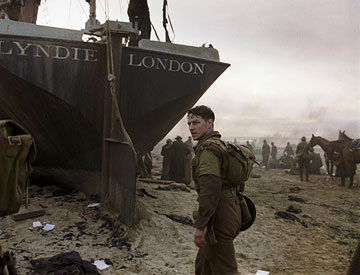 One of the central themes behind Atonement is the power of the word, both written and spoken. When we first meet Briony, she is a budding novelist and playwright. It is her love and talent for fiction, combined with her somewhat immature mind, and her overprotective feelings of her sister that creates the lie in the first place. One thing that the screenplay by Christopher Hampton (The Quiet American) does that I admired is that during the first half of the film, we first see a sequence through the eyes of Briony, and then the movie goes back, and shows us what really happened immediately afterward. In lesser hands, this approach could be confusing and awkward, but the direction of Joe Wright (Pride and Prejudice) and the tight editing makes it work. Briony's story is a heartbreaking one of a young girl who does not fully understand the world around her, and perhaps doesn't even understand her own actions. As she grows older and wiser, she learns to regret her past actions, and finds forgiveness almost impossible to find. Her powerful words continue to haunt her. The movie emphasizes this by having the thundering keys of a typewriter ring out on the soundtrack in tune with the music score. This method, surprisingly, gives the film an urgent tone. The keys pound away as percussion, adding a sense of urgency to the proceedings.
One of the central themes behind Atonement is the power of the word, both written and spoken. When we first meet Briony, she is a budding novelist and playwright. It is her love and talent for fiction, combined with her somewhat immature mind, and her overprotective feelings of her sister that creates the lie in the first place. One thing that the screenplay by Christopher Hampton (The Quiet American) does that I admired is that during the first half of the film, we first see a sequence through the eyes of Briony, and then the movie goes back, and shows us what really happened immediately afterward. In lesser hands, this approach could be confusing and awkward, but the direction of Joe Wright (Pride and Prejudice) and the tight editing makes it work. Briony's story is a heartbreaking one of a young girl who does not fully understand the world around her, and perhaps doesn't even understand her own actions. As she grows older and wiser, she learns to regret her past actions, and finds forgiveness almost impossible to find. Her powerful words continue to haunt her. The movie emphasizes this by having the thundering keys of a typewriter ring out on the soundtrack in tune with the music score. This method, surprisingly, gives the film an urgent tone. The keys pound away as percussion, adding a sense of urgency to the proceedings.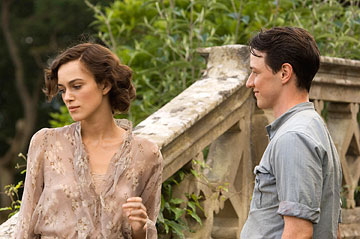 The first half of the film detailing the events that led to the lie is where the film is at its most tense. The relationships created between the three characters, and how they are torn apart are powerfully portrayed in the dialogue, the almost claustrophobic atmosphere of the family home, and the events leading up to the fateful night in question are all beautifully laid out. It's only when the story switches to Robbie's point of view as a soldier fighting on the frontlines that things start to dip somewhat. While there is nothing exactly wrong with the approach, the war scenes do not really offer nothing new, and consequently did not captivate me the same way the first hour or so did. Robbie, Cecilia, and their relationship are mostly left at the side to begin with, the movie mainly focusing on Briony and her misinterpretation, so when they are forced to be torn apart, it does not hit quite as hard as it should. Their story is just as tragic as Briony's, if not even more so, but it felt lesser to me due to the fact that their story seems to get less attention. Their relationship lacks passion, and at times even seems somewhat cold. Knightly's portrayal of Cecilia, in particular, is lacking warmth, as the movie never quite develops us into a character that we can truly get behind. When we are following Robbie, I found myself admiring the skill that the sequences were made more than the character or the story itself.
The first half of the film detailing the events that led to the lie is where the film is at its most tense. The relationships created between the three characters, and how they are torn apart are powerfully portrayed in the dialogue, the almost claustrophobic atmosphere of the family home, and the events leading up to the fateful night in question are all beautifully laid out. It's only when the story switches to Robbie's point of view as a soldier fighting on the frontlines that things start to dip somewhat. While there is nothing exactly wrong with the approach, the war scenes do not really offer nothing new, and consequently did not captivate me the same way the first hour or so did. Robbie, Cecilia, and their relationship are mostly left at the side to begin with, the movie mainly focusing on Briony and her misinterpretation, so when they are forced to be torn apart, it does not hit quite as hard as it should. Their story is just as tragic as Briony's, if not even more so, but it felt lesser to me due to the fact that their story seems to get less attention. Their relationship lacks passion, and at times even seems somewhat cold. Knightly's portrayal of Cecilia, in particular, is lacking warmth, as the movie never quite develops us into a character that we can truly get behind. When we are following Robbie, I found myself admiring the skill that the sequences were made more than the character or the story itself.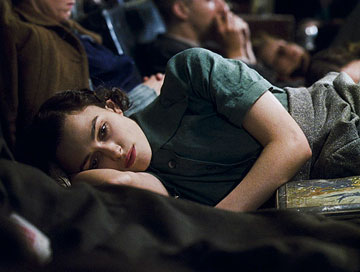 It's only when the attention returns to the older Briony that the film returns to form. Now 18, she is a nurse working for the war effort, trying to get in touch with her sister, who has dropped contact with her since the incident. The screenplay and the movie itself does a great job of developing her character, and what the years have done to her. It also certainly helps that Romola Garai does indeed bear a striking resemblance to young Saoirse Ronan, who plays the character at 13 during the first half of the film. They are both wonderful performances that are strong enough not only to hold our attention, but the film itself. When the movie steps away, we miss the strong presence of the character and the performances. When it is Vanessa Redgrave's turn to step in as the character during a sequence set in the present, it is a small but wonderful scene that adds a final touch of tragedy and loss to everything. The film does eventually come together, but I got a sense that as effective and emotional as the film's final sequence is, it would be even more so if the two young lovers were as strongly developed as the Briony character. I came to realize that she is truly the heart of the entire story. While the lovers are obviously important, they are nowhere near as compelling.
It's only when the attention returns to the older Briony that the film returns to form. Now 18, she is a nurse working for the war effort, trying to get in touch with her sister, who has dropped contact with her since the incident. The screenplay and the movie itself does a great job of developing her character, and what the years have done to her. It also certainly helps that Romola Garai does indeed bear a striking resemblance to young Saoirse Ronan, who plays the character at 13 during the first half of the film. They are both wonderful performances that are strong enough not only to hold our attention, but the film itself. When the movie steps away, we miss the strong presence of the character and the performances. When it is Vanessa Redgrave's turn to step in as the character during a sequence set in the present, it is a small but wonderful scene that adds a final touch of tragedy and loss to everything. The film does eventually come together, but I got a sense that as effective and emotional as the film's final sequence is, it would be even more so if the two young lovers were as strongly developed as the Briony character. I came to realize that she is truly the heart of the entire story. While the lovers are obviously important, they are nowhere near as compelling.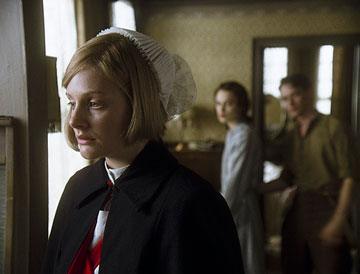
See the movie times in your area or buy the DVD at Amazon.com!






0 Comments:
Post a Comment
<< Home